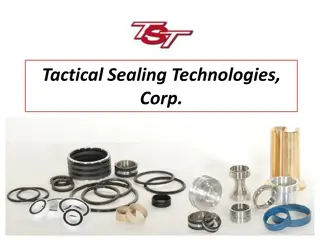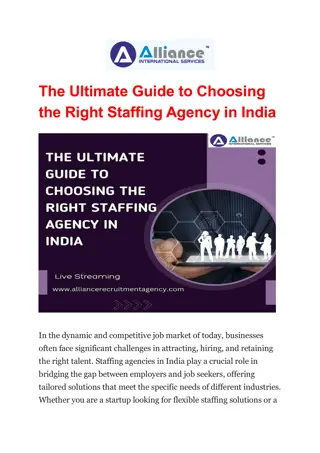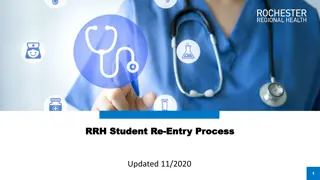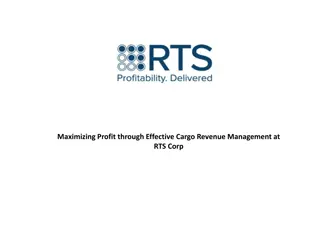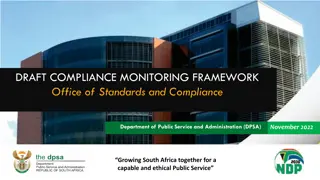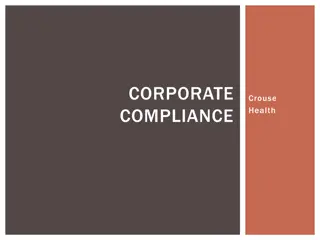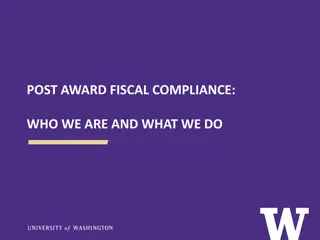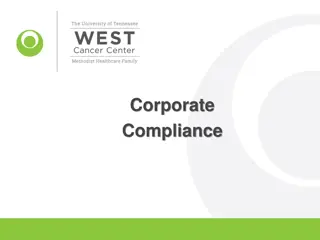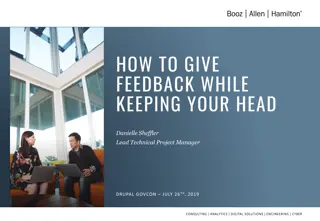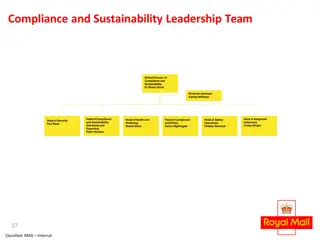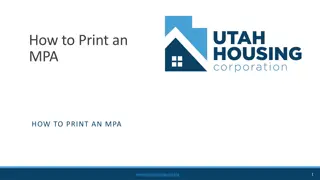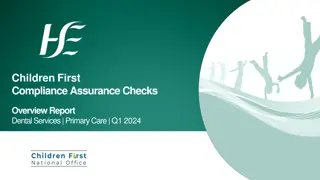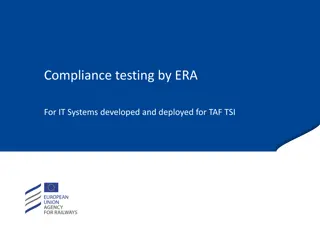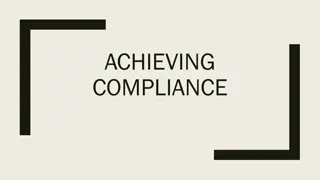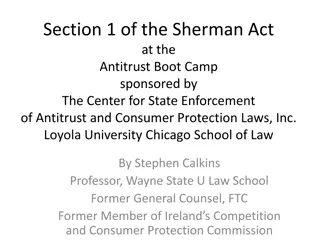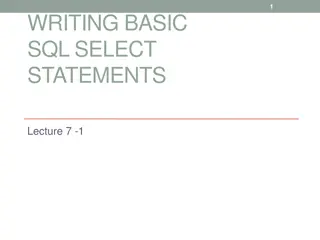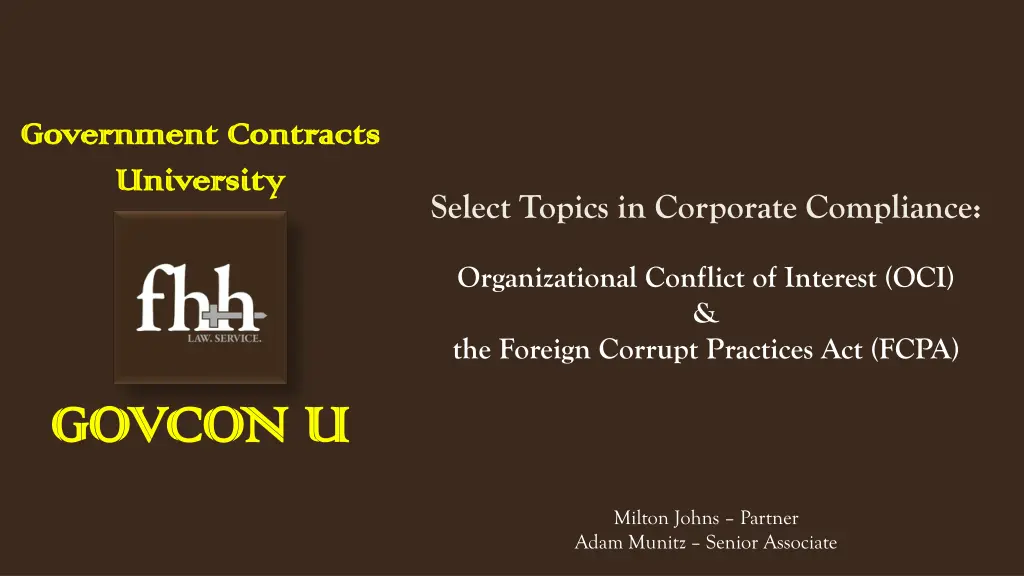
Topics in Corporate Compliance: OCI & FCPA Overview
Explore key concepts in corporate compliance focusing on Organizational Conflict of Interest (OCI) and the Foreign Corrupt Practices Act (FCPA). Learn about potential conflicts, regulatory implications, and real-world examples in government contracting.
Download Presentation

Please find below an Image/Link to download the presentation.
The content on the website is provided AS IS for your information and personal use only. It may not be sold, licensed, or shared on other websites without obtaining consent from the author. If you encounter any issues during the download, it is possible that the publisher has removed the file from their server.
You are allowed to download the files provided on this website for personal or commercial use, subject to the condition that they are used lawfully. All files are the property of their respective owners.
The content on the website is provided AS IS for your information and personal use only. It may not be sold, licensed, or shared on other websites without obtaining consent from the author.
E N D
Presentation Transcript
Government Contracts Government Contracts University University Select Topics in Corporate Compliance: Organizational Conflict of Interest (OCI) & the Foreign Corrupt Practices Act (FCPA) GOVCON U GOVCON U Milton Johns Partner Adam Munitz Senior Associate
Milton Johns, Esq. GOVCON U GOVCON U Partner, FH+H Has spent 30+ years in government and defense contracting arenas in a variety of roles Appeared and argued in General District and Circuit Courts of numerous Virginia jurisdictions, the Supreme Court of Virginia, the U.S. District Court, Eastern District of Virginia, the U.S. Bankruptcy Court, Eastern District of Virginia, U.S. Court of Federal Claims and the U.S. Fourth Circuit Court of Appeals
Adam Munitz, Esq. GOVCON U GOVCON U Senior Associate, FH+H Practice focuses on solving clients complex legal and business challenges in a wide variety of matters including foreign investment, export compliance, international business transactions, foreign ownership, control and influence, and government contracting. Mr. Munitz has spent years supporting agencies and corporations in the defense and national security sectors.
Organizational Conflict of Interest (OCI) GOVCON U GOVCON U What is it? Federal Acquisition Regulation Section 9.5 Impaired objectivity: Division X in Company A is tasked with reviewing work performed by Division Y in Company A Unfair Competitive Advantage: Division X of Company A drafts or assists the Government in preparing requirements for procurement awarded to Division Y of Company A Access to Proprietary or Source Selection Information: Personnel in Company A has access to proprietary information of Company B that enables Company A to underbid Company B on a procurement
OCI Experience GOVCON U GOVCON U Customer OCI concerns vary widely Undisclosed OCIs can provide valid basis for competitors to file bid protests Acquired Companies also may create OCIs with existing work Teammates may create OCIs
OCI Examples GOVCON U GOVCON U Company A provides systems engineering and technical direction to the Navy regarding system X. Company A may be prohibited from providing services or products when the Navy contracts to implement system X Why? Perception that Company A will orient ground rules to favor its interest
OCI Examples GOVCON U GOVCON U Company receives a contract to evaluate performance of other contractors on existing contracts and evaluate proposals for future work. Company will be barred from evaluating its own work and its own proposals. Why? Perception that Company s objectivity will be impaired if it is required to evaluate its own work or proposals.
OCI Examples GOVCON U GOVCON U Company receives a contract to provide management support to acquisition command of a DoD agency. Certain Company employees have access to databases containing proprietary or source selection information relating to Procurement X. If Company employees are not aware that they have access to the databases in question, does this still create a potential OCI? Possibly. Why? Perception that Company has unfair competitive advantage through access to proprietary or source selection information that cannot be negated because there is no proof that employees did not access the databases in question.
OCI Examples GOVCON U GOVCON U Do previous examples of OCI rules aimed at eliminating impaired objectivity, unfair competitive advantage and access to proprietary or source selection information apply to Company s subcontractors, subsidiaries and consultants? Answer: Yes.
OCI What Should a GovCon Do? GOVCON U GOVCON U Institute process to identify actual and potential OCIs as soon as possible Implement early in Business Development/Capture process Once OCIs are identified, the Company can implement a strategy for addressing or avoiding the OCI in question Can the OCI be mitigated? Must the Company choose among opportunities?
OCI Resolution Strategy GOVCON U GOVCON U Contracts/Legal support must work with line management to craft appropriate OCI resolution strategy Features of strategy vary widely depending on: Requirements of customers Underlying facts of OCI at issue Contractual and/or RFP OCI requirements at issue
OCI Resolution Strategy GOVCON U GOVCON U OCI Resolution Strategies include: No bid, or withdraw a previously submitted bid Obtain approval from existing and future customers of an OCI mitigation plan. Typical features of OCI mitigation plans: Electronic and physical firewalls for data and personnel NDAs signed by employees and Company; demarcation of types of services that business will and will not be permitted to provide to a particular customer Move work to teaming partner with no OCI
Summary GOVCON U GOVCON U Work with Legal support early and often! Know your Ts & Cs Establish/Implement Corporate policy on proposal reviews, Signature Authority, Risk Management We live in a COMPLIANCE world. Know the rules and where to go to get assistance Not always easier to get forgiveness rather than permission! Protect your business brand!
What is the FCPA? GOVCON U GOVCON U In very general terms, the FCPA is a U.S. law prohibiting payments to foreign officials in exchange for preferential treatment. 14
What Constitutes a Foreign Official? GOVCON U GOVCON U A foreign official is any officer or employee of a foreign government or any department, agency, or instrumentality thereof, or of a public international organization, or any person acting in an official capacity for or on behalf of any such government or department, agency, or instrumentality, or for or on behalf of any such public international organization. 15 U.S.C. 78dd-1(f)(1)(A). The FCPA also prohibits corrupt payments to foreign political parties and their officials, candidates for foreign political offices, and officers, employees, and representatives of state-owned or state-controlled non- U.S. businesses. 15
What Constitutes a Foreign Official? GOVCON U GOVCON U BUT WAIT- In addition, corrupt payments to an otherwise permitted individual may also be prohibited if the payer knows that such individual will, in turn, offer, give, or promise the payment (or part of the payment) to a foreign official. How do I know if I know? If you actually know that the ultimate recipient of the payment is a foreign official; If you avoid knowing that the ultimate recipient of the payment is a foreign official; or If you ignore signs that the ultimate recipient of the payment is a foreign official. 16
What Constitutes a Corrupt Payment? GOVCON U GOVCON U Anything of value! Travel Expenses Gifts Entertainment CASH Success = Irrelevant The mere offering, promising, or authorization to provide a corrupt payment constitutes a violation of the FCPA. Magnitude = Irrelevant The value of the object or service given, offered, promised or authorized is wholly irrelevant. Furthermore, even idiosyncratic gifts, if considered valuable by the recipient, can constitute a corrupt payment. 17
What Does Corruptly Mean? GOVCON U GOVCON U In order for a payment to qualify as corrupt, it must be made with the intent to incentivize the recipient to abuse his/her authority by granting preferential treatment, failing to take action, or improperly directing business towards the payer. Examples of preferential treatment (non-exclusive): A contract award Influencing the procurement process Circumventing the rules for importation of products Gaining access to non-public bid/tender information Evading taxes or penalties Influencing the adjudication of lawsuits or enforcement actions Obtaining exceptions to regulations Avoiding contract termination Waiving customs requirements Special access to visas Expedited approval of licenses, permits, etc. 18
Notable Enforcement Actions GOVCON U GOVCON U 1. Hewlett-Packard Company (April, 2014) Hewlett-Packard subsidiaries in Mexico, Poland, and Russia orchestrated complex schemes through which they funneled millions of dollars to government officials in exchange for valuable contracts with the Office of the Prosecutor General of the Russian Federation, the Polish National Policy agency, and Pemex, respectively. Total criminal and regulatory penalties: over $108,000,000 TAKEAWAY: Monitor your subsidiaries! Marubeni Corporation (March 19, 2014) Marubeni used two consultants to pay officials of Perusahaan Listrik Negara, Indonesia s state-owned and state-controlled electricity company, hundreds of thousands of dollars in exchange for the lucrative Taharan contract. Total criminal fine: $88,000,000 TAKEAWAY: Are your consultants really consulting? What is their precise role? Alcoa World Alumina LLC (January 9, 2014) Through using an intermediary with close ties to the Bahraini Royal Family, Alcoa s Australian subsidiary made tens of millions of dollars in corrupt payments to foreign officials in exchange for a long-term supply agreement with a government-controlled aluminum smelter. Total criminal and regulatory penalties: $384,000,000 TAKEAWAY: Know your intermediaries! 2. 3. 19
FCPA Compliance Strategies for Emerging Markets Pre-Transaction Compliance Strategies GOVCON U GOVCON U 1. Legal, regulatory and cultural research - Identify controlling entities Government? Military? Militias/Tribes? - Local presence requirements Likely in flux, so distinguish formal from informal requirements - Permit requirements (if any) Business licenses Visas Customs permits - Cultural pressure points Is corruption concentrated in particular ministries and sectors? - Transparency International - Leverage in-country network 2. Identify and assess all intermediaries pre- transaction - Local representatives - Consultants - Logisticians - Close-protection security - Couriers - Transportation providers - Translators 3. Customize international party questionnaires, anti-corruption certifications, and training materials for each in-country party (including clients) - Translate everything! 4. Set Tone - Establish low tolerance for corruption at outset 20
FCPA Compliance Strategies for Emerging Markets- Ongoing Compliance Strategies GOVCON U GOVCON U 1.Experienced cadre of in-country support staff Lawyers Accountants Bankers 2.In-country situational awareness Scheduled and unscheduled visits to intermediaries, support personnel, and clients Communicate, communicate, communicate! 3.Sophisticated reporting requirements and mechanisms Internal External 4.Hyper-focused accounting personnel Remember- the first signs of corruption will appear in irregular financial reporting 5.Alertness to political, legal, regulatory, military, and religious shifts 6.Adaptability Continually assess and re-assess efficacy of compliance strategy in light of in-country events and evolving client requirements 7.Dynamic disclosure strategy 8.Ongoing communications with trade counsel 21
Navigating Intermediary Relationships GOVCON U GOVCON U 1. Thorough Due Diligence Initiate Early International Party Questionnaires Anti-Corruption Certifications Investigative Follow-Up Red Flags Effective Training Practical Approach Translated In-Person Training Modules Assess responses! Emphasize: Consequences (legally and contractually) Corporate Commitment Sustained Monitoring Robust Accounting Program Frequent and In-Person Contact 2. 3. 22
Detection Mechanisms GOVCON U GOVCON U 1. 2. 3. 4. 5. 6. Development of Transaction-Specific Red Flags In-Country Presence Robust Accounting Program Routine and Non-Routine In-Country Audits Anonymous Reporting Hotline Private Investigative Services Recommended for select occasions Culture of Compliance Leadership should encourage the reporting of non-compliance, and this message should be widely disseminated. Reporting Requirements in Third-Party Contracts 7. 8. 23
Questions? GOVCON U GOVCON U For More Info FH+H www.fhhfirm.com (703) 590-1234 Milt Johns mjohns@fhhfirm.com Adam Munitz amunitz@fhhfirm.com

